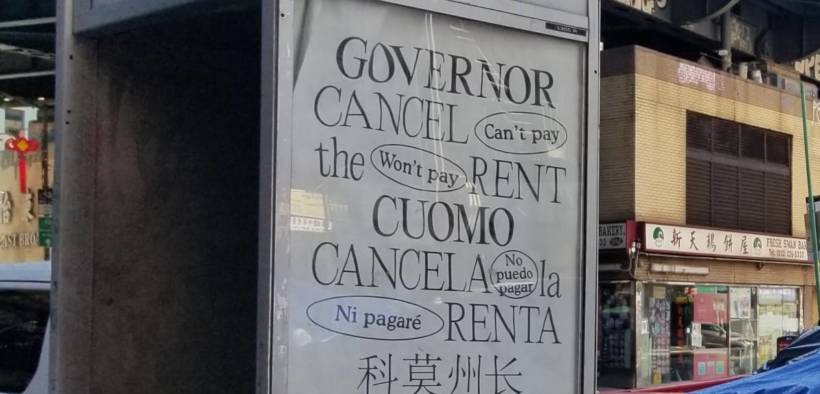Tech Giants Eye Lucrative Rent Market as End to Eviction Moratorium Could Leave Millions Homeless

A “tsunami” of evictions is about to sweep across the United States when the 120-day moratorium ends today, threatening millions of Americans with homelessness or worse – a new set of landlords called Facebook, Google and Apple.
(By: Raul Diego, Mintpress News) In a ‘normal’, pre-pandemic economy, a number roughly equal to the population of Pittsburg, Pennsylvania – or about 3.7 million people – are evicted every month in the United States, according to Matthew Desmond, principal investigator of Princeton University’s “Eviction Lab” project, which tracks evictions throughout the country and produces the first nationwide eviction database.
But, come Friday, July 24, those numbers could rise precipitously should the moratorium on evictions, included in the CARES Act be allowed to expire. The legislation afforded renters with a 120 days’ grace period from “fees, penalties, or charges in relation to nonpayment of rent” and barred landlords from filing eviction notices of any kind during that period.
The situation facing low-income communities is exceedingly harsh when considering the endemic economic disparity that characterizes cash-poor communities with scant access to any sort of financial resources or affordable credit. Studies on wealth inequality have shown time and again how excessive rent burdens can leave families on the brink of homelessness over relatively minor, unexpected emergencies like a simple car repair or a doctor’s visit.
A “semi-permanent renter class” has developed among poor African Americans, in particular. 1 in 11 people who fall into this demographic face eviction every year. For the rest of the United States, the rate is 1 in 20. African American communities and other communities of color are the most vulnerable to the approaching deadline, which not only opens the door for the resumption of eviction filings but also brings potentially large bills of fees and penalties, which the CARES Act allowed to accrue for 120 days.
A broad crisis
So far, few lawmakers have come out against the end of the moratorium despite the uncertainty and great potential for popular unrest this is likely to cause. Some cities like Houston have already lifted the eviction freeze leading many in the legal profession to expect a “tsunami” of eviction filings. The prospect of homelessness looms large over working families living on incomes under $40K a year; 40 percent of which lost a source of employment in March, according to Shamus Roller of the National Housing Law Project.
Milwaukee and Cleveland are two of the cities most at risk, with a 40 percent jump in eviction rates from their typical level at this time of year. The American Bar Association’s Task Force Committee on Evictions revealed that a staggering 28 million homes are at risk of coming under eviction orders due to the economic fallout of the COVID-19 pandemic. Emily Benfer, who chairs the ABA committee is also the co-creator of the COVID-19 Housing Policy Scorecard put out by the Eviction Lab.
In an editorial published Wednesday by NBC News, Benfer called for a “long-term solution to housing precarity and its disproportionate impact on Black and Latinx families” and warned that without “robust government intervention” the “avalanche of evictions” will take a heavy toll on entire communities. She predicts renters will suffer increasing levels of distress as unemployment benefits are cut off and reopened courts begin hearing thousands of pending evictions.
Benfer decried the Trump administration’s attempts to eliminate fair housing rules, that were set up to push back against “longstanding discriminatory housing practices,” echoing her partner at Eviction Lab, Matt Desmond, who contrasted the plight of African American and Latino renters with white American families who are “buffered” from the looming eviction crisis by virtue of most of them owning their own home.
In her concluding paragraph, Benfer asserted that we must “define our post-pandemic reality” and suggested that the government subsidize the housing market in toto while a new paradigm takes shape.
Public and Private Motives
Anti-eviction demonstrations are starting to sprout up around the country with organizations like the Cancel the Rent movement and Kansas City Tenants stage protests against the imminent expiration of the moratorium. Some state governments, like Andrew Cuomo’s office, are taking the initiative to implement rental assistance programs.
The federal government is joining the chorus through U.S. Representative, Ilhan Omar’s “Rent and Mortgage Cancellation Act of 2020,” a bill co-sponsored by Rep. Alexandria Ocasio-Cortez, Rep. Rashida Talib and 27 others, which calls for the effective annulment of rents and mortgages due for the (undefined) period of the Covid-19 pandemic and proposes the creation of a Landlord Relief Fund for property owners to recoup their losses.
Parallel to this and largely under the radar, however, the private tech sector is moving into position to swoop in and take advantage of the impending housing crisis. Just as news of a mysterious virus was breaking late last year, Facebook invested $1 billion for the construction of 20,000 new affordable housing units in California, following Google’s lead which had made the exact same commitment a few months earlier. Apple more than doubled Google’s and Facebook’s investment, combined, when it put down $2.5 billion for the same cause.
On the occasion of Facebook’s investment, California governor Gavin Newsom declared that the “State government cannot solve housing affordability alone” and praised the public-private partnership for advancing the fight against “economic inequality and restoring social mobility.”
Feature photo | People from a support organization for immigrant and working class communities unfold banners, including one advocating rent cancellation, on a subway platform in the Queens borough of New York during a vigil memorializing people who died from coronavirus. The pandemic has shut housing courts and prompted authorities around the U.S. to initiate policies protecting renters from eviction, May 21, 2020. Bebeto Matthews | AP
Raul Diego is a MintPress News Staff Writer, independent photojournalist, researcher, writer and documentary filmmaker.







